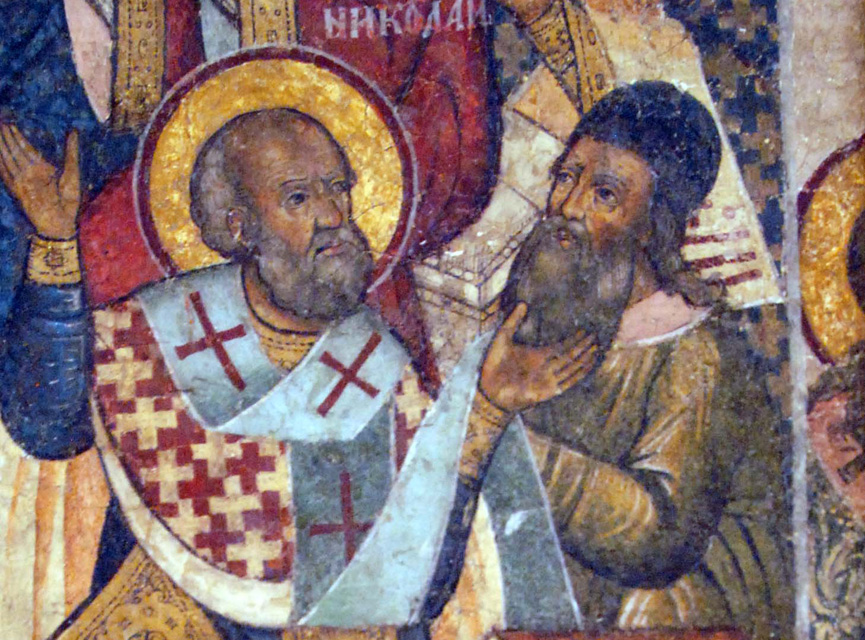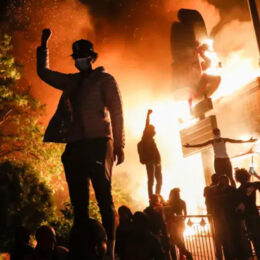Wall Street Opinion Journal Heather Wilhelm May 26, 2006
When Al Gore’s film on global warming, “An Inconvenient Truth,” arrived in theaters on Wednesday, it had the usual endorsements from Hollywood stars, left-leaning politicians and radical professors. But it also had a blurb from a more surprising figure: Richard Cizik, the vice president of government affairs for the National Association of Evangelicals.
Mr. Cizik has been hobnobbing with an unlikely crowd lately. One day he is in a Newsweek photo spread, clutching a Bible in front of the nation’s Capitol. The next he is posing barefoot in Vanity Fair, looking suspiciously as if he is walking on water. The following week he is chatting up Berkeley professors and joining political powwows with Bono.
With Mr. Cizik’s help, the National Association of Evangelicals (NAE)–representing 52 member denominations and about 30 million evangelicals–has become one of the most talked-about lobbying groups in the nation. But what are evangelicals lobbying for these days?
. . . more




2) Why Evangelical Protestantism is popular
I can answer this Olypiada but you have to brace yourself for some comments that will seem rude. Remember I am recounting what I know about what most people in the Protestant churches think, not what I think.
Firstly, relatively few Americans know much about Eastern Orthodoxy. Most are generally familiar with the Greek Orthodox and the Russian Orthodox. By familiar, I mean, they notice that these churches exist in their community. Early in their lives they were taught that the veneration of icons was straight out idolatry. Closed case. Few reopen the case. It is very complicated for most people to begin to sort out the theological differences between Protestantism, Roman Catholicism and Orthodoxy. Remember, modern education has almost eliminated the study of the history of Western civilization and few Americans even are aware of the history of Christianity in Europe and the Middle East even in the most rudimentary form.
Secondly, you have to understand how vapid and pointless the “mainline” Protestant churches have become. A high percentage of the clergy of the mainline Protestant churches are effectively atheist or gnostic. Example, a retired bishop of the UMC who is still active in UMC affairs has stated that the UMC is “too Christocentric.” At this point, you slap your forehead and go somewhere else where people believe in Christ.
Given that people yearn for the truths of the Bible. Evangelical Protestantism affirms the authority of the Bible while mainline Protestantism has relegated the Bible to something like a set of interesting stories and suggestions about a very nice person known as Jesus who is a good example for all. Evangelicals believe in Christ, mainline churches really don’t believe in Christ, it would be refreshing it they would just admit it.
Does this help?
Retaining some respect for evangelicals
I think it wise to retain some respect for evangelicals, even given the vast theological and practical differences. For instance, I think it is a very bad idea for evangelicals to send missionaries to Russia. HOWEVER, evangelicals have extended the reach of Christian thought quite effectively to China.
I will probably be blasted with a barrage of theological indignation but I think it is probably better for the soul of an individual to have learned something about Christ and the Bible from an evangelical than to have never heard the Gospel at all. Evangelicals have done a great deal in China and Africa.
Many evangelicals are sincerely willing to sacrifice for the Faith. Many evangelicals are in the lead of resisting the degradation of our culture.
Frankly, I haven’t seen any EO bishops take a public stand on many of the issues of the day. Evangelicals do take stands and they take the heat for better or for worse.
Note 3 Ethnicity can be offputting, human beings are often shallow
We have some terrific EO churches in our community, however, they are seen by others as mono-ethnic. Greek Orthodox church leadership rolls show that the active members of the Church are Greek-American (nothing wrong with that). Similarly, the O.C.A. churches often are the primary church for the Russian American community.(Nothing wrong with that.) This is a very shallow reason, I will grant, but everybody wants to feel as if they “fit in” and if you are the only Christopherson with all the “xxxxxopolous” you fear that you will stand out. Shallow thinking? Yes, Human nature? yes.
If you are raised in Protestantism, which has been the dominant religious school of thought in America ( you may remember the Pilgrims?), the ethnic differences, the liturgical differences, and the early teaching against the veneration of icons adds up to a pretty off-putting combination.
Obviously, these are rather SUPERFICIAL considerations, not worthy of the decision of where to worship. But you have to have some consideration of the momentous burden of abandoning the tradition with which you are raised and trying to figure out what is the true Church. Huge, momentous decision, multi-faceted, complicated theological issues, ARGH!!! Many oridinarily weak humans, such as myself, cringe before the task and make do with their original religious tradition.
4) Greek for a day
A perfectly wonderful Greek Orthodox church in my town hosted a Greek festival. The festival is very popular and well received. If you visit you get a pin that says “Greek for a day.” This pin was well-intended but still sent the message that it was a GREEK church more than an universal church for all Christians. Superficial thinking? Sure. However, people are often influenced more by emotions, impressions and hunches than logic.
It didn’t stop me from pigging out on the baklava.
Olympiada, Another reason evangelicalism is popular, they don’t belong to WCC and NCC
People repelled by the atheism, agnostism, gnosticism of the mainline Protestant churchs are looking for a place to worship where the Bible and Christ are held holy and sacred.
All of the EO branches (except the Antiochians) in American belong to the NCC (or is it WCC?). This organization is a front for secular, leftist politics. If you are leaving the mainline Protestant churches to get away from the NCC or WCC, you don’t want to end up in a church that supports those organizations as well.
During his debate with George W. Bush in 2000, Al Gore took some criticism for rolling his eyes and sighing while Mr. Bush was speaking. In this WSJ article author Heather Wilhelm can barely mention the name Al Gore without her own rhetorical roll of the eyes. Richard Cizik agrees with Al Gore, she seems to insinuate – there has to be some wrong with that. What? What is wrong, exactly and substantively, with Al Gore’s position on Global warming or his new movie, “An Inconvenient Truth“?
I get really sick of this snide, dishonest, intellectually lazy strategy of dismissing an entire argument with a “well, consider the source” wink and grin, without bothering to pretend to address the substantive merits or demerits of the argument in question. You know, so-and-so is a liberal, so just forget about it.
This is exactly what someone at church told me about the research of Father Stanley Harakas on the Orthodox Church and Just War doctrine. Was there something wrong with Father Stanley’s research into 15 centuries on canonical writing which found no support for a Just War”? My friend couldn’t say, but did tell me “everyone knew he was a liberal”, so forget about it.
If I had dismissed every author whose arguments I disagreed with because he was “conservative.” I would be poorer for it. While I don’t always agree with Victor Davis Hanson, for example, his articles are frequently full of jolting insights that force me to look at subjects a new way.
Every review of Al Gore’s new movie I’ve heard has praised it as powerful and compelling. It deserves to be seen and evaluated seriously and fairly.
I appreciated Missourian’s comment:
I was reared in a mainlilne Protestant denomination, and then I lived without the fellowship of the Church for most of my adult life. Through God’s grace and goodness, I find myself back in church. It is a Protestant denomination again, although it is not the one of my childhood. It is also not an “evangelical” denomination — at least, not in the way the term is commonly used today. And it is a denomination that deliberately, and regularly, and literally affirms the historic creeds of the Church.
When I commented actively in this blog, prior to becoming engaged in the life of the church I now attend, I was visiting Orthodox services several times a week. I was grateful for many things about those visits, including the welcome I received. I wonder if I will ever experience services as beautiful, or as soul-touching, as I did when worshipping with my generous, Orthodox friends.
Why do I mention all this? To point out that in choosing a Church home (and I did make a choice about denomination, even though I believe the “choice” to return to belief was outside of my control) one of the things I sought was lack of affiliation with the NCC or the WCC. In fact, I was trying to find a denomination that only sparingly made organizational pronouncements on social issues — but one that encouraged its members to be good, responsible, informed, and engaged citizens, based on their understanding of scripture.
So yes, for me WCC / NCC membership mattered quite a lot.
Thanks to Father Hans and all the folks who comment here. I look forward to continuing to read the excellent articles and your comments about current issues. Best wishes to you all!
“This is exactly what someone at church told me about the research of Father Stanley Harakas on the Orthodox Church and Just War doctrine. Was there something wrong with Father Stanley’s research into 15 centuries on canonical writing which found no support for a Just War”? My friend couldn’t say, but did tell me “everyone knew he was a liberal”, so forget about it.”
Fr. Harakas may be a “liberal” in the political sense, I don’t really know. he may be a “liberal” in the theological sense, I don’t know that either. I do know that he seems to find what he wants in his rather infamous “No Just War in the Fathers”, and others (e.g. Fr. Webster) disagree with him, and more importantly document well why. What seems to be occurring today is political liberals are leveraging the lack of systematic Just War reasoning in the Eastern Church to support their innovative “lesser evil” philosophy. Fr. Harakas supports this effort outright. So, when it comes to Just War thinking today, he is most certainly a “liberal” if that term is to be used to describe someone who supports the “lesser evil” innovation.
Augie,
I think I understand your reluctance to name your current denomination here, but could you speak a little more as to why you chose not to reveal it? I understand your thoughts on WCC/NCC membership. I confess that this was a MAJOR stumbling block for my entry into the Orthodox Church. Truth is, it delayed my entry by about a year. I believe then, as I do no, that membership in these political fronts can not be reconciled with Orthodox theology, or the Body of Christ. I think it reveals a profound ignorance/naivety about western culture and philosophy, and an unrecognized danger. I don’t go so far as certain “Churches in Resistance” do, but it is a major problem. In case you did not know, the Antiochian’s pulled out of the NCC last year (and are not direct members of the WCC). Unfortunately, the very same motion that pulled them out also affirmed the innovative “lesser evil” philosophy – which I assume was a political nod to the besieged patriarchs/bishops back in Syria. Still, it is a good development…
A profound ignorance of Western culture afflict many people in our Church, and I don’t mean only those converts who advance the novel concept that since they’ve become Orthodox, they are no longer Western.
I’m reading a new book by Vigan Gourian that draws from the good in the West in way that complement our Orthodox understanding of the Christian life. I strongly recommend to anyone interested in these topics: Rallying The Really Human Things : Moral Imagination In Politics Literature & Everyday Life .
.